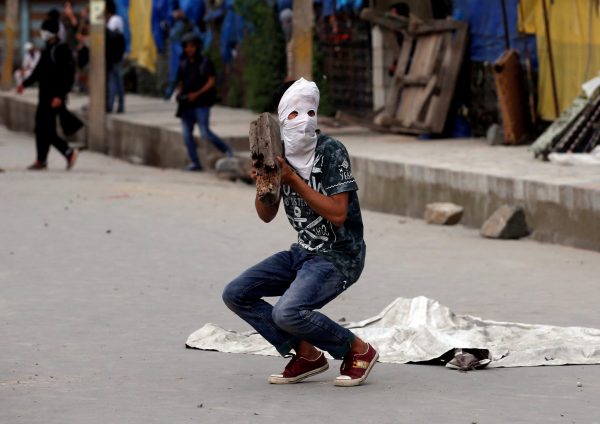India’s Election Commission ordered a re-poll just a few days later, which caused further embarrassment as only 709 people, or 2 per cent of voters, cast their ballots — the lowest turnout in the history of Jammu and Kashmir elections. This undermined the entire electoral process and stripped the candidates of all political legitimacy. Voters were likely either disinterested in the election or deterred by the dangerous political and security situation.
The tragic violence and dismal results from the Srinagar by-elections have reignited an intense debate in New Delhi. This debate centres on whether the situation is being further aggravated by Prime Minister Narendra Modi’s stance of eschewing dialogue and his disinterest in instituting a peace and reconciliation process with the disenfranchised domestic actors in Jammu and Kashmir.
For many Kashmiris, Modi’s Bharatiya Janata Party’s (BJP) national electoral success in 2014 caused unease given its Hindu nationalist moorings. This trepidation increased after the 2014 assembly polls in Jammu and Kashmir, as those polls led to the formation of an alliance between the People’s Democratic Party (PDP) — led by Mehbooba Mufti — and the BJP. Given the widely different agendas of the two parties on matters ranging from the peace process to security and constitutional reforms, the formation of the PDP–BJP alliance was akin to holding two opposing magnetic poles together via force.
The entry of the BJP into Jammu and Kashmir’s state-level politics signalled to many PDP supporters that the party had turned its back on Kashmiris to further its own political power. As no government in Jammu and Kashmir can survive without the blessing of the national government, the PDP was in need of the BJP’s support. Yet it must also demonstrate to its constituency that it exerts pressure on the Modi government, and the PDP’s dependence on the BJP to retain power in the state has constrained its leverage to secure concessions on its objectives. These include boosting the state’s development and initiating a comprehensive political peace process with all domestic stakeholders.
The lack of a peace process in Jammu and Kashmir, coupled with New Delhi’s political hubris, has cast a sense of hopelessness among Kashmiris, particularly the youth who are increasingly contesting the writ of the state through violence. Among the Kashmiris that decided to take up arms was 22-year old Burhan Muzafar Wani, a popular commander of the outlawed militant group Hizbul Mujahideen (HM). Wani was killed by Indian security forces on 8 July 2016.
Since Wani’s death, the Jammu and Kashmir state, particularly the Kashmir Valley that Srinagar lies within, has been simmering with violence that has already claimed the lives of 91 civilians and injured 12,000 others. The security force’s fatalities between July and December 2016 were also high with 50 soldiers and 21 policemen killed in the protests or in militant attacks carried out by Pakistan-based militant groups including HM, Lashkar-e-Taiba and Jaish-e-Mohammad.
The sudden upsurge in violence was partly because many Kashmiris regarded Wani as an embodiment of the spirit of resistance. He was seen as an icon representing the political aspirations of an isolated and neglected generation of Kashmiris, forgotten by New Delhi’s political elite.
Although Wani fought against the state and was considered a terrorist by Indian authorities, he argued that he was fighting against injustices and urged Kashmiri youth to counter what he believed was state oppression. This message resonated with a significant segment of Kashmiri youth. Wani has become a symbol of anger against the establishment as well as hope.
As the cycle of violence has continued into 2017, Wani’s message has proven to be even more mobilising in his death. This development is likely to continue escalating tensions in the Kashmir Valley following the recent killing of Wani’s successor, Sabzar Ahmad Bhat, in a security operation.
New Delhi ought to have initiated a dialogue with Kashmiris during the relative calm of winter-2016, but it chose not to. A likely explanation for this was the perception that talks are both unnecessary and a sign of weakness. Now, New Delhi should gear up to face a supercharged youth that is willing to die, confront security forces, aid the militancy and hoist the Pakistani flag to India’s chagrin. Modi’s decision to deny an ear to Kashmiri voices is likely to be a costly miscalculation as the Kashmir Valley gets ready for another summer of violence.
Nishank Motwani is a Visiting Fellow at the Asia-Pacific College of Diplomacy, The Australian National University.

